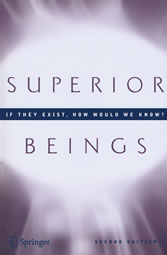Suchen und Finden
Mehr zum Inhalt

Superior Beings. If They Exist, How Would We Know? - Game-Theoretic Implications of Omnipotence, Omniscience, Immortality, and Incomprehensibility
Acknowledgments
13
Contents
15
Introduction
21
The Rationality of Belief in a Superior Being
32
2.1. Introduction
32
2.2. The Revelation Game
34
2.3. The Revelation Game Paradox
38
2.4. The Knowability Games
43
2.6. Conclusions
58
Omniscience and Partial Omniscience
60
3.1. Introduction
60
3.2. Some Effects of Omniscience
62
3.3. Newcomb's Problem
65
3.4. Which Principle, and Is There a Conflict?
69
3.5. Newcomb's Problem Symmetricized: Prisoners' Dilemma
71
3.6. A Solution to Prisoners' Dilemina
73
3.7. Cooperation or Noncooperation?
76
3.8. Implications of Mutual Predictability for SB and P
79
3.9. Conclusions
83
The Paradox of Omniscience and the Theory of Moves
85
4.1. Introduction
85
4.2. The Paradox of Omniscience
87
4.3. A Resolution of the Paradox of Omniscience
90
4.4. Theory of Moves
93
4.5. A Second Paradox: Moves May Provide No Resolution
102
4.6. Conclusions
107
Omnipotence: Moving and Staying Power
109
5.1. Introduction
109
5.2. Moving Power
111
5.3. Is There a Paradox of Moving Power?
117
5.4. Theological Interpretations of Moving Power
119
5.5. Staying Power
122
5.6. An Algorithm for Determining S- Power Outcomes
126
5.7. M-Power Versus S-Poiver in the Commitment Game and Other Situations
133
5.8. Conclusions
138
Immortality and Incomprehen-sibility
140
6.1. Introduction
140
6.2. Threats and Immortality
141
6.3. Repeated Plays
145
6.4. Threat Power in the Punishment Game: When Immortality Is Decisive in an Asymmetrical Game
154
6.5. Deception by the Superior Being
158
6.6. The Truth Game and the Problem of Evil
163
6.7. Conclusions
171
Superior Beings: They May Be Undecidable
173
7.1. Introduction
173
7.2. Undecidability
174
7.3. Arbitrariness and Undecidability
180
Appendix
188
Glossary
193
Bibliography
200
Index
205
Alle Preise verstehen sich inklusive der gesetzlichen MwSt.


















